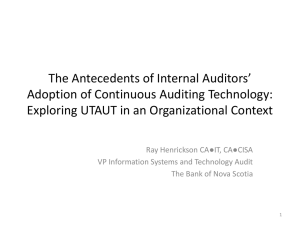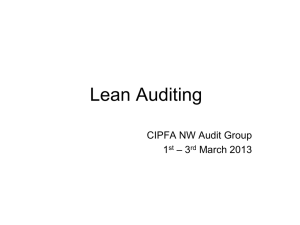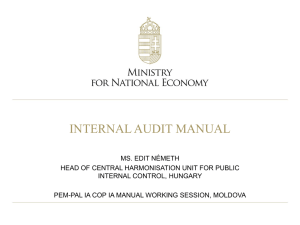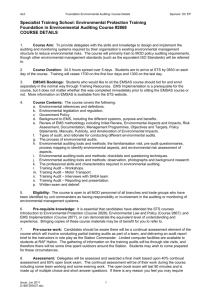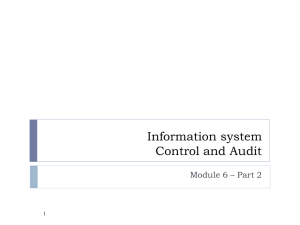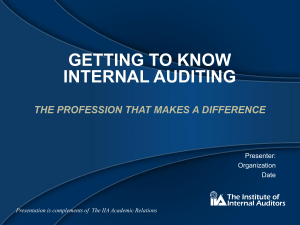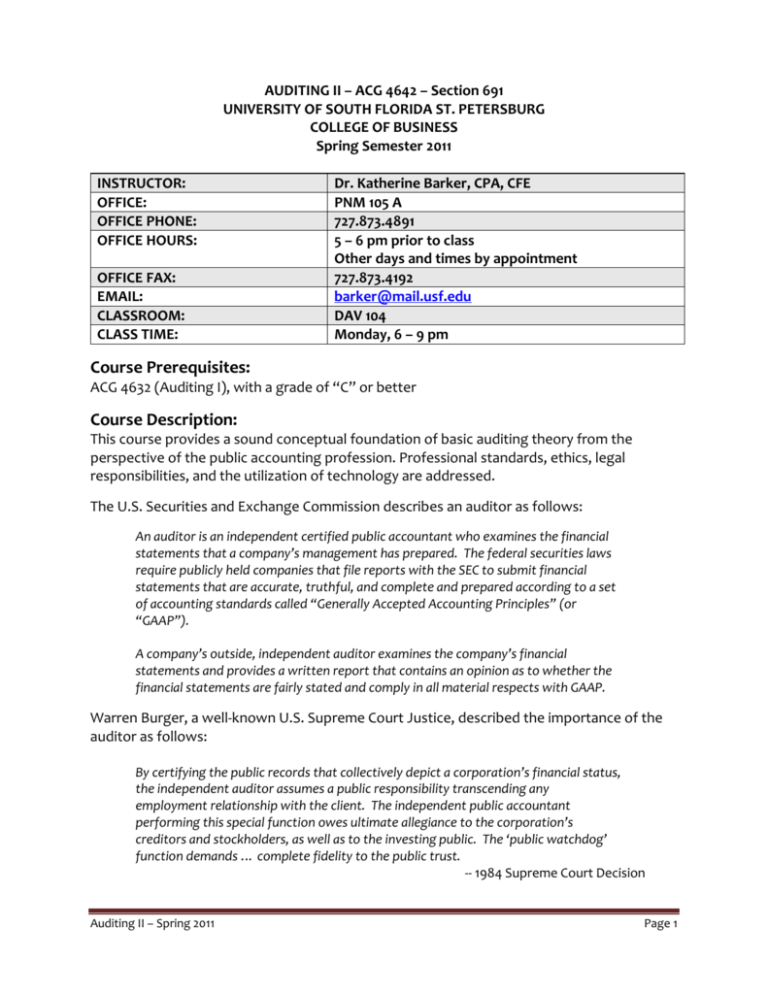
AUDITING II – ACG 4642 – Section 691
UNIVERSITY OF SOUTH FLORIDA ST. PETERSBURG
COLLEGE OF BUSINESS
Spring Semester 2011
INSTRUCTOR:
OFFICE:
OFFICE PHONE:
OFFICE HOURS:
OFFICE FAX:
EMAIL:
CLASSROOM:
CLASS TIME:
Dr. Katherine Barker, CPA, CFE
PNM 105 A
727.873.4891
5 – 6 pm prior to class
Other days and times by appointment
727.873.4192
barker@mail.usf.edu
DAV 104
Monday, 6 – 9 pm
Course Prerequisites:
ACG 4632 (Auditing I), with a grade of “C” or better
Course Description:
This course provides a sound conceptual foundation of basic auditing theory from the
perspective of the public accounting profession. Professional standards, ethics, legal
responsibilities, and the utilization of technology are addressed.
The U.S. Securities and Exchange Commission describes an auditor as follows:
An auditor is an independent certified public accountant who examines the financial
statements that a company’s management has prepared. The federal securities laws
require publicly held companies that file reports with the SEC to submit financial
statements that are accurate, truthful, and complete and prepared according to a set
of accounting standards called “Generally Accepted Accounting Principles” (or
“GAAP”).
A company’s outside, independent auditor examines the company’s financial
statements and provides a written report that contains an opinion as to whether the
financial statements are fairly stated and comply in all material respects with GAAP.
Warren Burger, a well-known U.S. Supreme Court Justice, described the importance of the
auditor as follows:
By certifying the public records that collectively depict a corporation’s financial status,
the independent auditor assumes a public responsibility transcending any
employment relationship with the client. The independent public accountant
performing this special function owes ultimate allegiance to the corporation’s
creditors and stockholders, as well as to the investing public. The ‘public watchdog’
function demands … complete fidelity to the public trust.
-- 1984 Supreme Court Decision
Auditing II – Spring 2011
Page 1
Objectives:
The primary objectives of this course are to:
1. To build on the basic auditing concepts covered in Auditing I and to research generally
accepted auditing standards in greater depth;
2. Master advanced auditing topics and theory, emerging issues in auditing, and study the
concept of fraud examination;
3. Improve your application of Generally Accepted Accounting Principles and Generally
Accepted Auditing Standards;
4. Accelerate your maturity and ability to apply professional auditing (and accounting)
judgment;
5. Obtain the skill, knowledge and personal traits needed to practice successfully as auditors;
6. Analyze problematic situations (including the analysis of financial statements) that auditors
have dealt with in the past to obtain a better understanding of how to cope constructively
with such scenarios in the future;
7. Increase our awareness of key ethical issues that audit practitioners face presently and in the
near future;
8. In reading auditing cases, prioritize and rank the more important issues as it relates to the
profession; and
9. Identify and improve upon weak internal control policies and procedures in order to reduce
or eliminate fraud.
10. Acquire a broad overview of the nature and magnitude of the problem of economic fraud
that affect domestic and international business, nonprofit and government organizations.
11. Develop a general understanding of how the accounting profession prevents and detects
fraud, including accounting academic research’s role in furthering knowledge about fraud
prevention and detection.
12. Appreciate how internal controls can help to reduce the risk of fraud, including a general
understanding of various control frameworks and knowledge of specific control procedures
related to particular types of fraud.
13. To help prepare for professional examinations that cover auditing (e.g., CPA, CIA, CMA).
The above objectives will help guide students to meet the following performance objectives. At the
conclusion of the course, students should be able to:
Demonstrate knowledge and understanding of U.S. auditing standards.
Demonstrate knowledge and understanding of audit reports and the circumstances that
require issuing a specific audit report.
Demonstrate knowledge and understanding of COSO’s Internal Control – Integrated
Framework.
Demonstrate knowledge and understanding of ethical conduct for professional external
auditors.
Demonstrate knowledge of the Sarbanes-Oxley Act of 2002 and PCAOB Standards.
Describe specific current issues confronting SEC (publicly-traded) audit clients.
Demonstrate the ability to successfully work together in student audit teams.
Auditing II – Spring 2011
Page 2
Required Materials:
1. Professional Auditing Standards, as of June, 2010. The standards are published by the
AICPA and are available through the university bookstore in two volumes. (There is
no ISBN # for the Standards.)
2. Contemporary Auditing: Real Issues & Cases, 7th edition, Author: Michael C. Knapp;
Publisher: South-Western Cengage Learning.
ISBN 10:
1-439-07819-X
ISBN 13:
978-1-439-07819-8
3. PCAOB Standards are available on line from the PCAOB website.
4. Gleim CPA Audit Review (2011 edition) – This can be obtained directly from Gleim; call
800- 874-5346, or go to the website: www.gleim.com. Be sure to mention that you
are a USF St. Petersburg student to receive a discount from Gleim.
ISBISBN: 978-1-58194-854-7 (2011 edition)
Recommended Reference:
1. Auditing and Assurance Services: An Integrated Approach (13th edition);
Authors: Arens, Elder, and Beasley; Publisher: Pearson Prentice-Hall, Inc.
ISBN 10:
ISBN 13:
0-13-612827-0
978-0-13-612827-4
Communications:
I am always happy to help you and welcome your questions. Please feel free to ask
questions before, during, or after class. Email is the best way to contact me if you are off
campus. I will usually be available in my office (PNM 105A) or the classroom from 5:00 –
6:00 p.m. prior to class.
Topical Coverage of Course:
Approx Percentage
50%
20%
20%
10%
100%
Review of Generally Accepted Auditing Standards
Auditing Standards Research
Auditing Case Analysis and Presentations
Current Events Presentation
Student Evaluation by Instructor:
Exam I
Exam II
Auditing Standards – Presentations
Auditing Standards Research Papers
Auditing Case Analysis: 2 Audit Cases –
written analysis by Audit Teams
Class quizzes
Current Events Presentation and Paper
Auditing II – Spring 2011
Points
100
120
40
80
Percentage
20%
24%
8%
16%
100
40
20
500
20%
8%
4%
100%
Page 3
Course Grading:
Letter Grade
Point Spread
Percentage
A
450 – 500
90% and >
B
400 – 449
80% to 89.9%
C
350 – 399
70% to 79.9%
D
300 – 349
60% to 69.9%
F
below 300
< 60%
Note 1: Plus and minus grades are not given in this course.
Note 2: No extra credit is available in this course.
Note 3: No quiz makeups are allowed for any reason. You must be in the classroom when
quizzes are given.
Note 4: Final letter grades may be curved at instructor’s discretion.
Exams:
Students are expected to attend all exams. Exams may consist of multiple-choice questions,
but may also contain short answer questions, cases, or short essay questions.
Topical coverage will be announced prior to each exam and students are responsible for any
of the following materials that are:
• Presented in class (via your instructor, news articles, videos, outside professional
speakers, or presentations of other students, etc.),
• Distributed or available on Blackboard,
• Contained in any assigned chapters,
• Contained in any prior quiz or exam,
• Covered by any homework assignment,
• Questions contained at the end of every chapter covered,
• Sample questions contained at the end of Power Point slides presented in class or
posted on Blackboard,
• Sample test questions provided on Blackboard, and
• Questions contained in the required Gleim Auditing Study Guide (References relating
the audit text chapters to the Gleim Study Units are available.)
You must discuss any reason for missing an exam with the instructor in advance of the exam.
Make-up exams, if allowed, will be taken at the convenience of the instructor within one
week of the scheduled exam. Failure to take an exam without the instructor’s prior
approval will result in a grade of zero points for the exam. The instructor reserves the right
to require documentation to substantiate the reason for not taking any exam at the
regularly scheduled time.
Requests to re-grade an exam will be honored only if the request is received within one
week of the date the exam is returned. No re-grade requests will be honored if received
after this time limit. Except in the case of footing errors, the entire exam will be re-graded.
(This means that your grade could go down as well as up.) All exam papers will be
destroyed two (2) weeks after the end of the semester.
Auditing II – Spring 2011
Page 4
Auditing Standards – Team Presentations:
Audit teams will be assigned in Week 2 and each team will present a summary of auditing
standard(s) assigned. Each team presentation should use Power Point and the presentation
should be approximately 10-20 minutes. The intent is to give students an additional
opportunity to make a presentation, gain insight into the auditing standards, and to share
that knowledge with the class.
Auditing Standards Research:
Auditing standards have been changing rapidly due to the dynamic nature of the economic
climate, recent changes by the FASB in the codification of GAAP, and the anticipated
international accounting standards. Students will research and report on two selected areas
of current audit interest using the Auditing Standards published by the AICPA. Written
reports will be required and will be graded by the instructor. Specific topics will be
announced by the instructor in class and on Blackboard during the course.
Quizzes:
There are expected to be five (5) quizzes during the course, each = ten (10) points.
The lowest quiz score will be dropped so there will be four quizzes computed in total grade.
You must be present in class to take a quiz. Topical coverage will be announced prior to
each quiz. Dates of each quiz will be announced by your instructor or shown in the course
schedule. There may also be other unannounced or ungraded quizzes.
Note: No quiz makeups are allowed for any reason. You must be in the
classroom when quizzes are given or you may not take the quiz.
Auditing Case Analysis
Analysis of auditing cases presented in the auditing case book (Contemporary Auditing: Real
Issues & Cases). Students will learn to analyze problematic situations (including the analysis
of financial statements and application of analytical procedures) that auditors have dealt
with in the past to obtain a better understanding of how to cope constructively with such
scenarios in the future.
In studying auditing cases, students will learn to
• Identify the applicable auditing standards;
• To prioritize and rank the more important issues related to the profession;
• Increase awareness of key ethical issues that audit practitioners face;
• Identify and improve upon weak internal control policies and procedures in order
to reduce or eliminate fraud.
Current Events Presentation:
Each student will be required to make one current events presentation to the class.
Students will select an article of interest to auditors from business periodicals, newspapers,
or the Internet. The written summary will consist of no more than one typed page in good
business English format, complete with proper attribution. Summaries may be single or
Auditing II – Spring 2011
Page 5
double spaced. Each student will also make a 2-3 minute oral presentation to the class during
the course. Students will be graded on the written summary.
Course Policies:
Student Preparation:
The material in this class is appropriately difficult for an upper-level 4th – year accounting
course. As such, students will understand the lectures much better by being well prepared
for each class. This means that
(1) You have read the relevant materials assigned, and
(2) You have re-read the relevant materials assigned.
Educational research has shown that student participation leads to more active learning and
higher retention of material. Students should be prepared to discuss assignments in class.
Course Schedule:
The Course Schedule is a separate document and is to be considered a “working document.”
This means that there may be changes made for various reasons during the course of the
semester. Your instructor will make every effort to be guided by the dates provided in the
Course Schedule. Students are asked to understand that there are times when schedule
changes are made in the best interests of the students (e.g., weather issues, traffic issues, or
problems regarding availability of class resources).
Blackboard:
Students are responsible to check Blackboard on a regular basis, and at least prior to each
class, for information regarding assignments, additional information provided by the
instructor, or for any changes made to the course schedule.
Calculators:
Students should bring calculators with them to every class even though there will not be
calculations required for each class. Students are expected to act as professional auditors
who are prepared to make quick calculations at any time. Calculators may be used on all
exams or quizzes, however no calculators that are able to store text will be allowed for
exams.
Attendance and Classroom Behavior:
Timely attendance is expected of all students for all classes. Attendance will be taken at any
time during each class period. Any student who has excessive unexcused absences (more
than two during the term) is subject to a grade reduction of one letter at the discretion of
the instructor. Students are also expected to act in a professional manner at all times.
Withdrawal:
A “W” grade is given to students who have withdrawn from the course by the university’s
drop deadline, which is Saturday, March 26, 2011.
Auditing II – Spring 2011
Page 6
Release of Grades:
I am not permitted to release any grades or exam scores over the telephone or by email.
Your exam scores and final letter grade will be posted to Blackboard unless there is a
problem with the university Blackboard grading system. Please access them there. Please
notify the instructor if you have any problems accessing grades in Blackboard.
Religious Observances:
Under university policy all students who anticipate the necessity of being absent from class
due to the observation of a major religious observance must provide notice of the date(s) to
me, in writing by the second class meeting.
Disabilities:
Pursuant to the Americans with Disabilities Act, reasonable accommodations will be made
for disabilities upon notification to the university by the first week of class. Please notify
your instructor if you have a learning disability or require special assistance with this course.
Cellular Phones & Wireless Internet Devices: All cellular phones, pagers, etc. must be
silenced during class. The use of IPods, IPhones, or similar devices is not permitted to be
used in class. No text messages permitted between students during the class. (You are free
to leave class to make an emergency call, if necessary.)
Academic Dishonesty:
Academic dishonesty will be dealt with very severely. The university’s policy on
academic dishonesty and disruption of the academic process is clearly set forth in the USF
Undergraduate Catalog (http://www.stpete.usf.edu/ugc/undergraduate_catalog.htm ).
Please be advised that punishment for academic dishonesty will result in automatically
failing the course, as well as possible suspension or expulsion from the university. Academic
dishonesty includes plagiarism. The university policy requires all sources to be cited
precisely, including electronic sources.
Recording Devices:
Notebook computers may be used to take notes, and lectures may be tape recorded. They
are to be used solely by the student for his or her use and not to be sold.
Auditing II – Spring 2011
Page 7
Key Leadership Skills and Perspectives Addressed in this Course
Interpersonal & Analytical Information
Reflective
Communication and Critical Technology
Thinking &
Skills
Thinking
Skills
Experiential
Skills
Learning
5
5
5
5
Key: “1” = no coverage and “5” = extensive coverage.
Ethical and
Social
Multicultural
Consciousness Competence
5
2
Interpersonal & Communication Skills: Primarily in class discussions, homework discussions,
and audit team-based civic engagement assignment.
Analytical and Critical Thinking Skills: Auditing is a theoretical accounting course that involves
constant analytical and critical thinking skills; these skills will be used throughout the course.
Information Technology Skills: Extensive use of Blackboard, the Internet, Microsoft Word,
Excel, and Power Point.
Reflective Thinking & Experiential Learning: Required throughout the course, particularly in
researching and reporting on auditing standards and preparation of paper related to civic
engagement assignment.
Ethical and Social Consciousness: Provided throughout the course in lectures, homework
assignments, current events coverage, outside professional speakers, and civic engagement
assignment.
Multicultural Competence: References made throughout the course to the global business
environment, international accounting standards, and international auditing concerns, and
additionally provided through civic engagement assignment.
Auditing II – Spring 2011
Page 8
COURSE SCHEDULE
ACG 4642 – Section 691 – Auditing II – Spring 2011
Monday, 6 – 9 pm – DAV 104
(Prepared 12/12/2010)
This is a “working document.” The instructor reserves the right to alter or amend this schedule at any time.
Note: Dates of any outside professional speakers will be announced in class and on Blackboard.
2011 Date
(Class #)
Jan 10
(1)
Topics Covered in Class
Course Administration
Introductions
Lecture/Discussion – Internal Control
(AU 314, AU 325 & PCAOB No. 5)
Description of Audit Research Papers
Jan 17
Jan 24
(2)
Homework
Read AU 314, AU 325, PCAOB No. 5
Read Case 3.5 – Goodner Brothers, Inc.
for discussion next class
Read AICPA Professional Code of
Conduct for next class
Martin Luther King, Jr. Holiday – University Closed
Quiz – AICPA Code of Professional Conduct
Current Events – Instructor will demonstrate a
current events presentation and give students a copy
of a summary of a current news article.
Read Case 7.3 – Scott Fane, CPA, for
discussion during next class
Read AU 312 for next class
Student sign up for Current Events Presentations
Audit Teams Assigned
Discussion – Case 3.5 – Goodner Brothers, Inc.
Lecture/Discussion – AICPA Code of Professional
Conduct
Jan 31
(3)
Quiz – Internal Control
Student Current Events Presentations
Audit Team Case Assignment #1: Case
1.6 – Star Technologies, Inc.
Discussion – Case 7.3 – Scott Fane, CPA
Read AU 326 and AU 329 for next class
Lecture/Discussion – Risk & Materiality (AU 312)
Feb 7
(4)
Quiz – Risk and Materiality
Read AR 100 for next class
Student Current Events Presentations
Lecture/Discussion: Audit Evidence (AU 326) and
Analytical Procedures (AU 329)
Audit Team 1 presents AU 110 and AU 120
Auditing II – Spring 2011
Page 9
Feb 14
(5)
Student Current Events Presentations
Auditing Research Paper #1 Due at
beginning of class
Lecture/Discussion – Compilation and Review of
Financial Statements (AR 100)
Audit Team 2 presents AU 150 and AU 161
Audit Team 3 presents AU 230
Feb 21
(6)
Feb 28
(7)
EXAM I
No in-class meeting
Read AU 342 & AU 334 for next class
Audit Teams to work on Case Assignment #1 – Star
Technologies
Mar 7
(8)
Review Exam I
Team Case Assignment #1 due at
beginning of class (Star Technologies)
Student Current Events Presentations
Read AU 317 for next class
Lecture/Discussion – Going Concern (AU 342) and
Related Parties (AU 334)
Audit Team 4 presents AU 230
Audit Team 5 presents AU 311
Mar 14-19
USF Spring Break
Mar 21
(9)
Quiz – Going Concern & Related Parties
Student Current Events Presentations
Class discussion of Case 5.6 – American Fuel &
Supply Company, Inc.
Read Case 5.6 – American Fuel & Supply
Company, Inc. for discussion at next
class
Audit Team Case Assignment #2: Case
1.10 – United States Surgical
Corporation
Read AU 350 for next class
Lecture/Discussion – Illegal Acts by Clients (AU 317)
Audit Team 6 presents AU 315
Mar 28
(10)
Student Current Events Presentations
Lecture/Discussion – Audit Sampling (AU 350) (Gleim
reference: Study Unit 15: Evidence – Sampling)
Auditing Research Paper #2 Due at
beginning of class
Read AU 316 for next class
Audit Team 7 presents AU 317
Apr 4
(11)
Student Current Events Presentations
Lecture/Discussion – Consideration of Fraud in a
Financial Statement Audit (AU 316)
Audit Team 8 presents AU 330
Auditing II – Spring 2011
Page 10
Apr 11
(12)
Quiz – Consideration of Fraud
Student Current Events Presentations
Read AU 337 and AU 380 for next class
Audit Team 9 presents AU 339
Time for teams to work on Case Assignment #2
Apr 18
(13)
Student Current Events Presentations
Lecture/Discussion – Litigation, Claims &
Assessment (AU 337) and Communication with
Governance (AU 380)
Team Case Assignment #2 due at
beginning of class (United States
Surgical)
Audit Team 10 presents AU 342
Apr 25
(14)
Last Class Day
Student Current Events Presentations
Class discussion of course (informal – for the benefit
of the instructor)
Student Evaluations (formal)
Discussion of coverage of EXAM II
May 2
EXAM II (coverage = everything in class since last
Exam) (up to 3 hours allowed)
Sun, May 8
Spring Commencement – St. Petersburg
Auditing II – Spring 2011
Page 11


